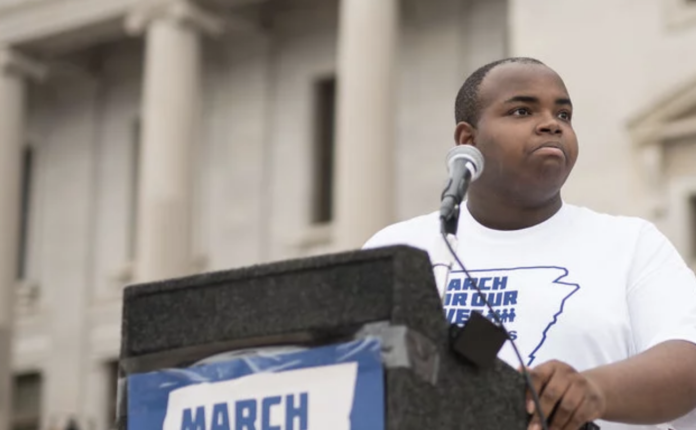UPDATE 2 (9/14/20): After looking into the allegations raised in the original post (and raised by other people as well), the Pulaski County Clerk’s Office sent a letter regarding Chris Kingsby to the Pulaski County Prosecutor’s Office. To wit:
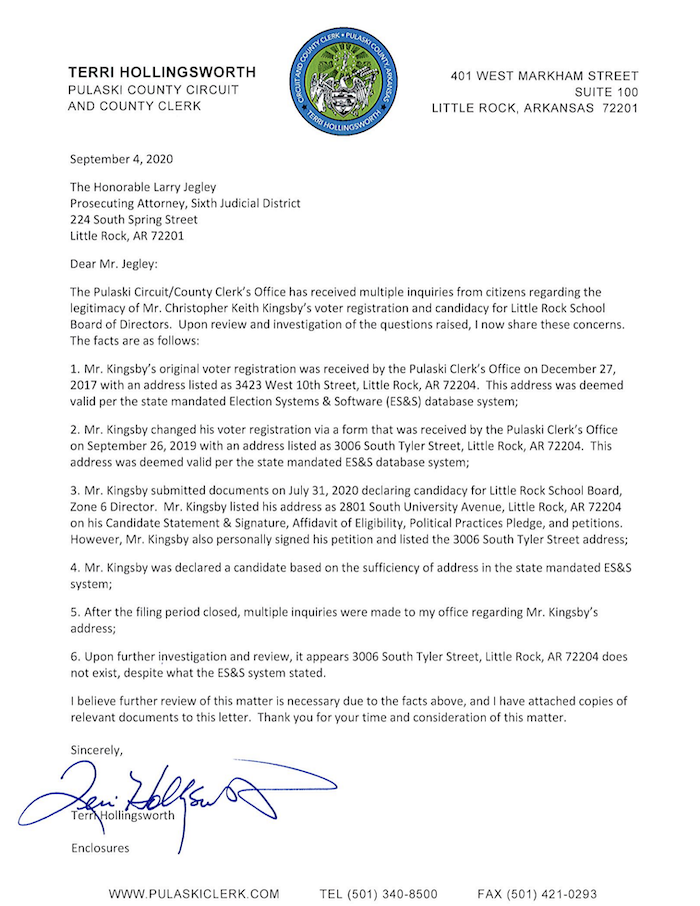
Now, a couple of things. First, I thought we sort of sussed out the Taylor/Tyler thing in the original post when we chalked it up to sloppy handwriting by Kingsby when he registered to vote. But if, as the letter alleges, Kingsby listed the Tyler address, which doesn’t exist and isn’t place that he has claimed to live, rather than the Taylor address, that is an issue. At the very least, in addition to asking why a non-student (or anyone) would use the UALR street address to run for office, this action raises the question, “why would someone continue to use a non-existent address, rather than correcting an incorrect entry so it reflected the actual address that he was claiming as his residence?”
Second, the change-of-address form looks as if his prior residence was 3923 W. 10th St., rather than 3423 10th St. as the letter states. But his original voter registration form does appear to say 3423 W. 10th.
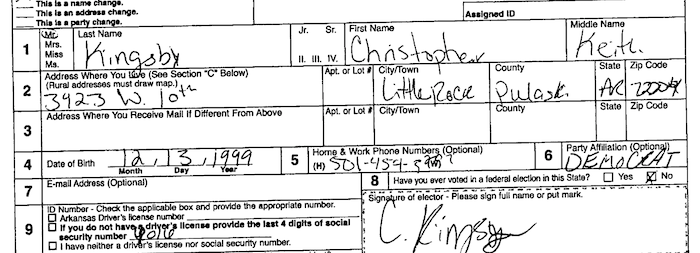
If he did, in fact, use 3423 W. 10th Street when he first registered to vote, that is a problem, as that address is an empty lot.
Finally, the Clerk’s letter mentions the 2801 S. University Ave. address that Kingsby listed on the candidacy forms to run for LRSD school board, but does not mention that that address is the street address for the UALR main campus and is not possibly an address that would be where a non-student resided. To the extent that the prosecutor’s office looks into all of this, that would seem to be something that needs to be addressed, given how it looks through the lens of Arkansas criminal law.
Whether anything will come of this, I cannot say. But referring it to an outside agency for further investigation was definitely the right move in this instance, so I am glad to see that the Clerk felt so as well.
UPDATE: Shortly after I tweeted a link to the original post below yesterday, LRSD School Board Candidate Chris Kingsby retweeted the link and encouraged people to check out his website to find out how they could help with his campaign. Someone commented, asking him what his explanation was for using the 2801 S. University address. His reply made me wonder just how closely he had read the original post, as he wrote:
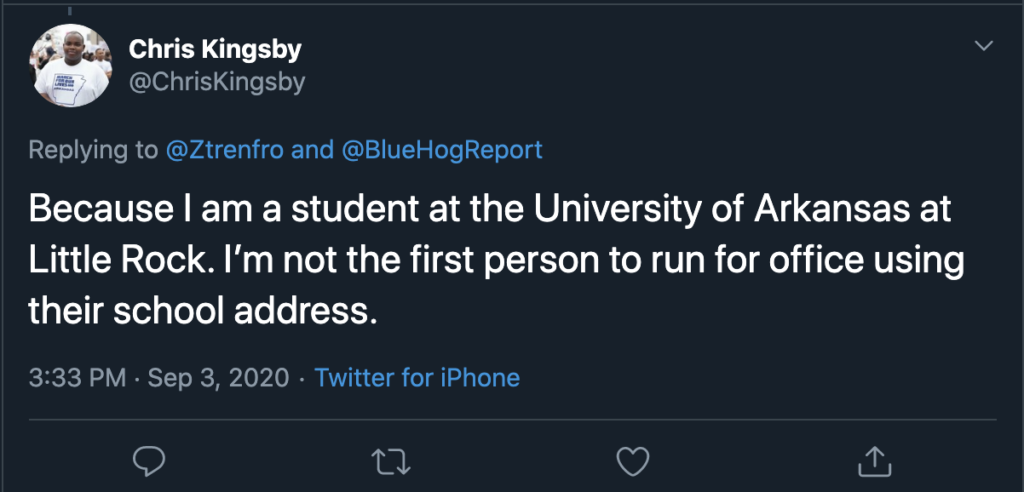
I replied to this, noting that, no, he was not a student at UALR, at least according to UALR.
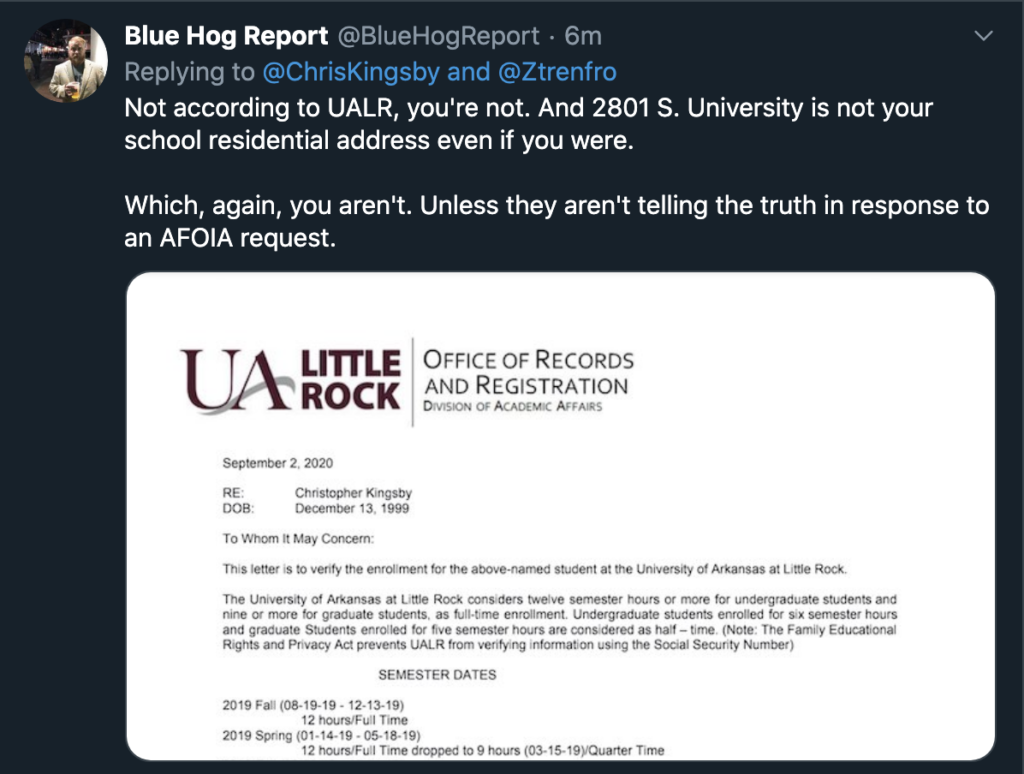
Kingsby deleted the “because I am a student” tweet almost immediately after my comment and the letter were posted. Make of that what you will, I suppose.
*****
ORIGINAL POST: What is going on with Zone 6 in the Little Rock School Board races? First, it was FranSha’ Anderson’s (née Dametrice FranSha’ Burke) and her hot-check convictions that should render her ineligible to hold elected office in Arkansas.
That is when I noticed Anderson’s fellow Zone 6 candidate, Chris Kingsby, and the address that he had listed on his candidate forms.
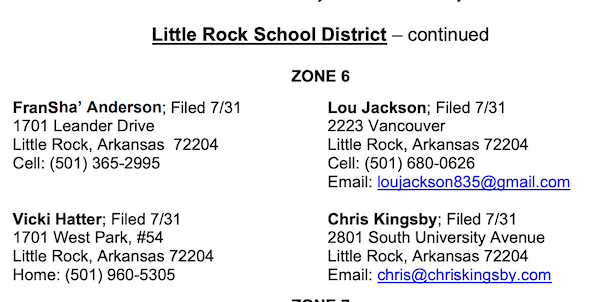
As you might already be aware, 2801 S. University Ave. is the main address for the University of Arkansas-Little Rock. So, my first though was that maybe he is a student there. Except that address is not a campus housing address or a mailing address for a UALR student. As the UALR housing handbook explains:
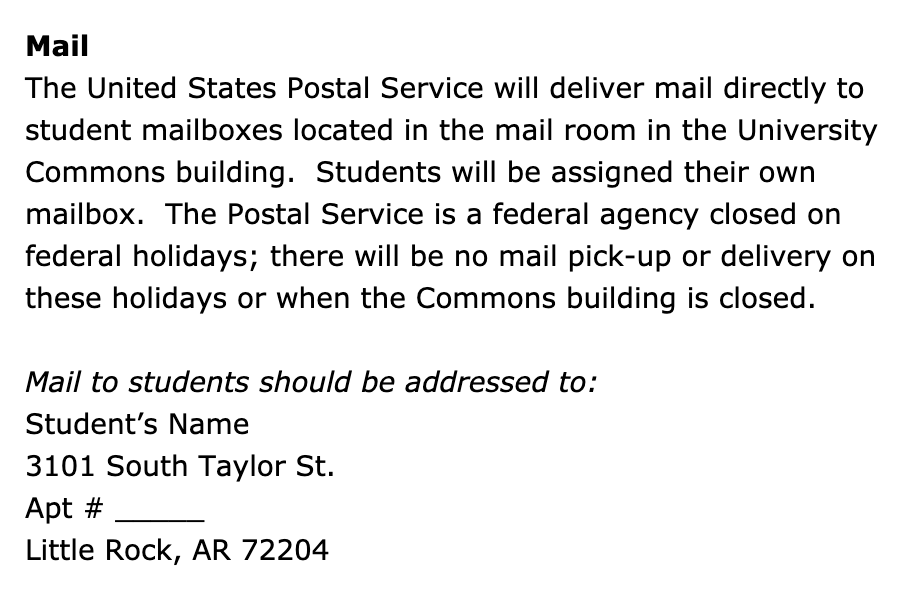
Now, keep in mind that the affidavit of eligibility to run for the LRSD board specifically asks for the “Residential Address of Candidate (Street).” In response to that, Kingsby wrote:
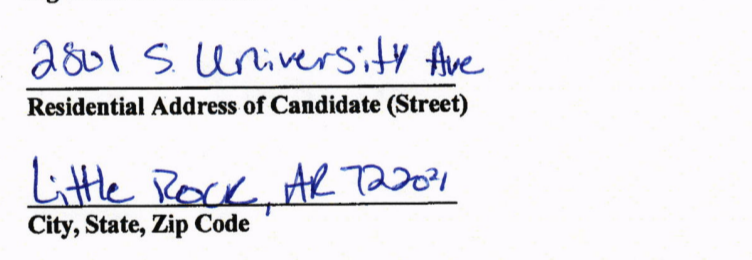
Why would someone put the main address for the UALR campus as his residential address, when that is neither his actual address nor the proper mailing address for someone who might be a student there? Curious. So I pulled his voter registration and saw this:
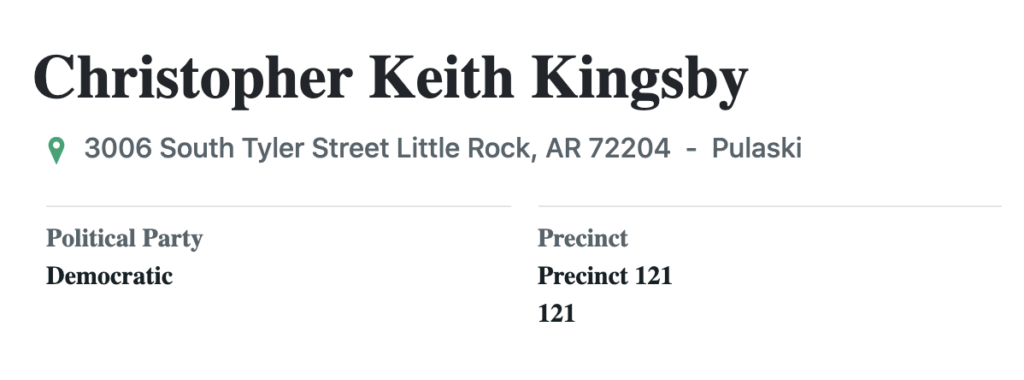
But…wait. 3006 S. Tyler St. is not an address that exists in Little Rock. The houses on that stretch of Tyler are numbered 3002 and 3008. So I requested his voter registration information from the Pulaski County Clerk, and I received this change-of-address form dated September 26, 2019:
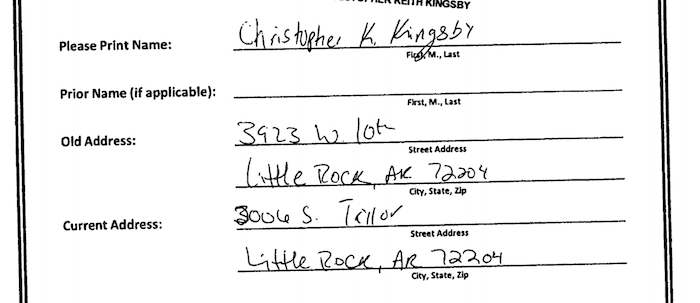
If you look closely, it appears that Kingsby did not write “3006 S. Tyler St.” when he changed his address, but “3006 S. Taylor St.,” and it was just because of sloppy handwriting that the address was entered incorrectly in the voter information file. This would make more sense, at least superficially, as 3006 S. Taylor is the address of the West Residence Hall on the UALR campus. But that opens a whole other can of worms, because here is Kingsby’s voting history:

He voted in the 2020 Primary Elections in March of this year, at his assigned polling place, when his address was listed (as it is now) as “3006 S. Tyler St.” But voting in person in Arkansas requires, among other things, that the poll worker, “request the voter, in the presence of the poll worker, to state his or her address and state his or her date of birth;” “determine that the voter’s date of birth and address are the same as those on the precinct voter registration list;” and “request that the voter present verification of voter registration by providing a document or identification card that meets the requirements of Arkansas Constitution, Amendment 51, § 13.”
So, if he wrote “3006 S. Taylor St.” on his change-of-address form, wouldn’t he also say “3006 S. Taylor St.” when asked by a poll worker? Wouldn’t his license or voter ID card say Taylor instead of Tyler? Where the address given/shown by a voter does not match what is in the precinct records, the poll worker is supposed to verify registration and address with the County Clerk and either have the voter fill out a registration form to update the records (if the address is within that same precinct) or direct him to the proper polling place (if the address is in a different precinct). Did that not happen, or did “Taylor” and “Tyler” look and sound close enough that no one noticed?
But, whatever. Let’s assume, for the sake of argument, that the Taylor/Tyler issue is not a big deal in this instance because they are both in the same school board zone and house district.
I mean, if he’s registered to vote at 3006 S. Taylor St.–which is what he claimed as his street address less than a year ago–why wouldn’t he put that address as his street address on his affidavit for eligibility? Both 3006 S. Taylor and 2801 S. University are in the same zone, so it is not like he would have been trying to use the S. University address to run in a zone that was different than the S. Taylor address. A generous guess would be that he is enrolled at UALR for fall 2020 classes, he planned to live on campus this 2020-2021 school year, and he had not yet received a housing assignment as of July 31 when he had to file to run for school board.
That theory is plausible on its face, but it isn’t correct. I sent a FOIA request to UALR for releasable directory information that is not prohibited from release under FERPA. According to the records keeper at UALR, Kingsby was not enrolled at UALR for Spring 2020 and is not enrolled for Fall 2020. So he could not have been simply waiting on a housing assignment as of the date he filed to run for school board. And, if we needed more confirmation that this was not simply a case of Kingsby waiting on a housing assignment (despite not attending this semester, I mean), there is the fact UALR has a totally different, off-campus address for Kingsby’s last-known place of residence:

All of which, taken as a whole, can mean only one thing: Kingsby filed to run for office using an address that was not where he actually lived. He did not live at 3006 S. Taylor St. as of July 31, despite that being his voter-registration address, because that is student housing and he was not a student the prior semester. He did not live at 3006 S. Tyler as of that date because that address does not exist. And he certainly did not live at 2801 S. University Ave. on any date, because no one does. Nevertheless, he put “2801 South University Avenue” on his campaign filing forms despite knowing that it was not his real residential address, rather than putting the address of wherever he actually lived as of the date he filed. Or, to sum it up in a gif:

What is the practical effect of this? That is somewhat less clear than, say, FranSha’ Anderson’s ineligibility to hold office in Arkansas. It is worth noting, first, that the Affidavit of Eligibility has the address below the sentence that says a person swears “that the above statements are true and correct,” the Candidate Statement just has a person sign to affirm that he has received the candidate handbook, and the Political Practices Pledge only has a person sign that they are familiar with the requirements of certain statutes. So, at least on the face of those documents, knowingly using an incorrect address does not render the signatures problematic.
Secondly, the law requires that, where a person files to run for school board, the “county clerk shall not accept a candidate’s petition until the county clerk has verified that [t]he address where the candidate is registered to vote is within the election zone, if applicable, represented by the position on the board of directors that the candidate has indicated on the petition.”
That is where this could be a problem for Kingsby, at least if knowingly using the wrong address to file for office amounts to “mak[ing] a false entry in…a public record” that is done “with the purpose of impairing the verity” of that record. It would certainly appear that intentionally writing an address where you do not live on a blank that says “Residential Address of Candidate (Street)” would impair the truth (i.e., the “verity”) of that record. And, because the zone he is running in is based on the stated address, it would appear that the use of the false address was done with the purpose of impairing the truth of that record. If that is the situation, then an argument can be made that Kingsby’s use of 2801 S. University as his claimed residence on the forms he filed with the clerk amounts to Tampering with a Public Record,
Even if it does not rise to the level of being criminal, though, all of this is just a very odd situation that–at minimum–shows a needs to revamp how these filings are done and/or create some sort of penalty (whether it’s automatic disqualification or something more) when a person uses a false address on their filing documents. Certainly, the law–and the voters–contemplates that a person runs in the zone where he or she lives and that the address used when filing to run reflects that person’s actual residence. If, as is the case here, a person can use an address that is not only not his residence, but is not even a residence, and still be eligible to run, then there is no point to having zones for candidates, as anyone can simply put any address, even if it is not where they are registered to vote. As it currently sits, based on what Kingsby has shown here, a person would not even have to live in Little Rock to run for school board, provided they put down a Little Rock address on the filing forms. While that might bode well for the NW Arkansas folks who would love nothing more than to control the LRSD board, that is not something that we should allow without a fight.
As a postscript, I should add that I sent a message to Chris Kingsby, asking about his use of the UALR address on the forms. I have not received a response as of this writing.
The fact that Kingsby thought I would not have already verified whether he was a student at UALR this semester is a pretty ridiculous assumption on his part.
As with everything on this website, this is not legal advice, but anyone planning to file a ballot challenge to have her deemed ineligible might want to get on that ASAP, seeing as how it appears to be a slam-dunk case and getting the fourth candidate out of the race makes it more likely that one of the others could win without a run-off.
